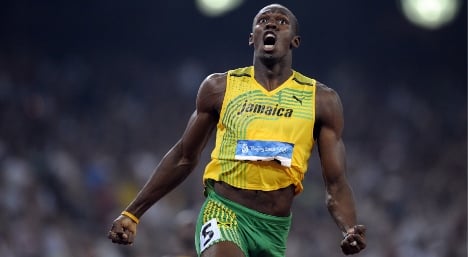Bolt took the Beijing Olympics by storm last summer, as the towering, laid-back Jamaican won the double gold sprint and claimed gold as part of Jamaica’s 4x100m relay team. Amazingly, all of his victories set new world record times.
He has continued his impressive form into this season, but the year’s best marks in both the 100 and 200m races (9.77 and 19.58sec respectively) have been set by arch-rival Gay, the American who endured a miserable Olympics after rushing back from a debilitating hamstring injury.
Gay is also the runner with the world credentials, having emulated Bolt’s triple gold feat at the last world championships in Osaka two years ago. The duo have, to the delight of their agents ahead of a showcase competition, avoided each other so far this season. But the Jamaican claims to have been performing only at 85 percent of his capability and has displayed levels of confidence expected of macho sprinters.
“I would love to do better than the Olympics, just going out there and winning is enough for me,” said the 22-year-old, who is looking to break his own 100m world record of 9.69sec when he takes to the track on Saturday.
“Expectations are going to be higher here than Beijing, but I am ready to go and do my best. I know what I did there and I know the high responsibility which comes with it, I am working hard to do better than last year,” he said. “I have no problems, I am in good shape and itching to race now.”
Gay said that breaching the world record would be the ultimate target: “I believe Usain Bolt will try to break the world record, why wouldn’t he?”
“If that is what it takes to win the 100m, that is what I will have to do and I will try to do the same,” he said. “The world record is the only number I have in mind, I want to win more than anything, but I want to run fast. I don’t want to run 9.99 and people say it wasn’t fast. I believe 9.60secs is obtainable – that is my goal.”
At the Osaka worlds in 2007, Gay spearheaded the US team to the top of the overall table, matching a meet record with 14 titles. Kenya came second with five, thanks to their incomparable distance runners, with Russia in third.
On the track, the US team again looks strong, with the likes of 400m specialists Jeremy Wariner, Lashawn Merritt and Sanya Richards all offering strong gold medal contenders.
Wariner, Allyson Felix, Kerron Clement, Michelle Perry, Reese Hoffa, Brad Walker and Bernard Lagat will all defend world titles from two years ago. In the field, pole-vault queen Yelena Isinbayeva will be seeking to overcome a minor blip of finishing second in the recent London Grand Prix to continue her domination.
The Russian, who has won two Olympic and two world crowns, was adamant that she would use the loss to Poland’s Anna Rogowska to her advantage.
“I’m happy I lost because I feel more motivated and will concentrate more on Berlin now,” the 27-year-old said. “I am still very confident. I know I can build a big gap ahead of the field like before.”
Ethiopian middle-distance duo Kenenisa Bekele and Tirunesh Dibaba will be out to build on their Olympic form in both the 5,000m and 10,000m, when they won an unprecedented double gold to boost their country up to 18th in the overall medals table.
Dibaba will likely be up against compatriot Meseret Defar, the Athens Olympic champion who timed her run to perfection to win her first 5000m title in Osaka.



 Please whitelist us to continue reading.
Please whitelist us to continue reading.
Member comments